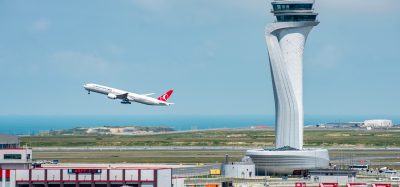Aviation is of national strategic importance for the Republic of Cyprus
- Like
- Digg
- Del
- Tumblr
- VKontakte
- Buffer
- Love This
- Odnoklassniki
- Meneame
- Blogger
- Amazon
- Yahoo Mail
- Gmail
- AOL
- Newsvine
- HackerNews
- Evernote
- MySpace
- Mail.ru
- Viadeo
- Line
- Comments
- Yummly
- SMS
- Viber
- Telegram
- Subscribe
- Skype
- Facebook Messenger
- Kakao
- LiveJournal
- Yammer
- Edgar
- Fintel
- Mix
- Instapaper
- Copy Link
Posted: 8 July 2019 | Tara Nolan (International Airport Review), Vassiliki Anastassiadou | No comments yet
Following the 29th Annual Congress and Assembly hosted in Cyprus, we spoke to Vassiliki Anastassiadou, Minister of Transport, Communications and Works to investigate the Cypriote aviation industry.


As Minister of Transport, Communications and Works in Cyprus, Vassiliki Anastassiadou is frequently, meeting with associates, organisations, guilds, mayors and community councils to exchange views and solutions regarding transportation development across Cyprus.
Noting “the Ministry of Transport is a very challenging place to work”, we stole a few minutes of her time to find out how Cyprus’ aviation is developing and what challenges need to be tackled.
How would you describe Cyprus’ current aviation sector? Is it an area of growth or does it require development and investment?
Aviation is an industry of national strategic importance for the Republic of Cyprus. Being an island, air transport services are vital in order to connect us to the rest of the world. A safe, secure and efficient aviation industry underpins a range of business, trade and tourism activities that contribute significantly to the economic prosperity of the island. It is therefore important for airports, together with airlines, air traffic management, ground handling and other stakeholders to cooperate efficiently, to meet the increasing demand of flights. As a major stakeholder, airports should not be considered individually but rather as part of the European network. This would ensure better connectivity, which is vital for business and for the economy to grow. ACI has a major role to play in this as the representative organisation of airports.
Consequently, major importance is attributed to scheduled flights operating on a given frequency round the year, whilst charter flights are also of significant importance for increasing tourist arrivals and revenues for the benefit of the economy. Of course they both also help increase Cyprus’ connectivity with the rest of the world.
We need to adapt to the demands of the present era and take into full account the requirements of the travelling public. At the same time, appropriate investments need to be made.
To what extent does the transport (aviation) sector contribute to Cyprus’ economy?
Sufficient air connectivity between Cyprus and the rest of the world is the key for further economic development of the island. Cyprus as an island, located at the edge of the EU, depends solely on air transport for its connectivity to the outside world. The aviation sector is an area of continuous growth. To date, Cyprus has concluded bilateral agreements with 51 countries and initialled agreements with 20 countries. Although overall connectivity has now reached a satisfactory level, there is still room for improvement and this can be achieved by attracting new markets and by strengthening existing markets with great potential such as Germany, France, Ireland and Italy.
In cooperation with Hermes Airports Ltd., the Government of the Republic of Cyprus has adopted incentive schemes for airlines which have been successful in improving connectivity as well as the economic development of the country. Any improvements in air connectivity will lead to an increased competitiveness of our tourist product, increased arrivals of tourists, increased revenues and will assist in extending the summer tourist period.
Larnaka and Pafos International Airports have been managed by Hermes Airports Ltd. under a 25-year Build-Operate-Transfer Concession Agreement with the Republic of Cyprus, since 2006. Hermes Airports Ltd. contributes to the country’s economy through an active air service development strategy consisting of the provision of incentive schemes and joint marketing activities with airlines, as well as collaboration with the government and tourism stakeholders for the expansion of tourism related opportunities.
The DCA’s Revenue for 2018 amounted to €84 million. The main areas of revenue are overflight fees and airport operation rights.
Air transport in Cyprus has shown steady and continuous growth in recent years. Larnaka and Pafos International Airports, handled almost 11 million passengers in 2018. Contributing factors to this growth are the regulatory framework implemented within the European Union and the “Open Skies” policy implemented by the Government of Cyprus in its relation to third countries.
In an ideal world, how would you change the aviation industry in Cyprus?
The Government of the Republic of Cyprus supports every aviation-related project which helps to improve air connectivity and at the same time remains actively engaged in all European and regional projects related to air transport policy and regulation, safety, infrastructure rehabilitation, institutional strengthening, and capacity building.
Where would you like to see Cyprus’ aviation industry in 10 years?
In the long term, more structural changes are required, through new technologies and innovative air traffic management solutions from definition, development and deployment, to operations based on SESAR (Single European Sky ATM Research Program) solutions and building on the reorganisation of European airspace. Our aim will be to make the best possible use of the existing infrastructure and at the same time, improve the quality and efficiency of services provided.
Our long term aim of course is to create the potential for Cyprus to become a regional transit hub between Europe and the Middle East.
How do you plan to achieve this goal?
Cyprus is working hard to meet all the new challenges that the aviation sector poses and in doing so we must also take into account the current performance regulation, which requires extensive investments in systems and people. Our goal is for the establishment of a state-owned entity to provide air navigation services within the Nicosia FIR and at Larnaca and Pafos Airports. This new entity will have the financial viability and flexibility to effectively deliver the required contributions to the Single European Sky performance targets for the benefit of safety, capacity, cost-efficiency and the environment.
To conclude, what are you most proud of since becoming Minister of Transport, Communications and Works in Cyprus?
I am proud of fact that after the difficult period of economic crisis, we have managed to put many projects back on track.
The implementation of development projects, and all kinds of projects that facilitate the daily life of the citizens and contribute to the more efficient operation of the state, is both an objective and a priority.
I am therefore proud of the fact that we are at the final stage of the establishment of a state-owned air navigation company, which has been pending since 2016, and that we are launching a tender for the installation of the long-awaited traffic law enforcement camera system.
The Ministry is also in the process of appointing a consultant to prepare the tender documents for the development of the new industrial port in Vasilikos.
Related topics
Air traffic control/management (ATC/ATM), Airport development, Economy, Regulation and Legislation
Related airports
Larnaca International Airport (LCA), Pafos International Airport (PFO)


















